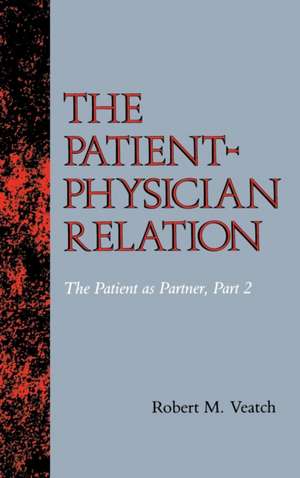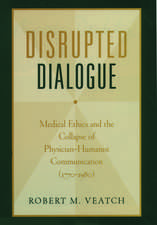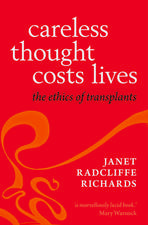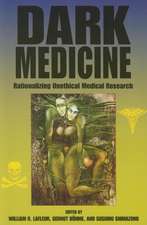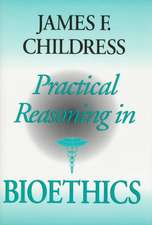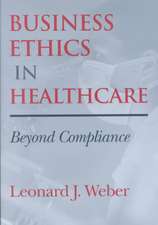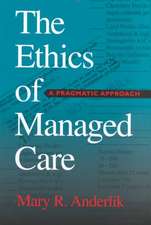The Patient–Physician Relation – The Patient as Partner, Part 2
Autor Robert M. Veatchen Limba Engleză Hardback – 21 ian 1991
..". a fascinating dissection of almost every aspect of the doctor-patient relationship.... strongly recommended reading for all health care workers interested in this rapidly evolving field." Queen s Quarterly
"This outstanding discussion of important current medical issues is a valuable addition to academic and professional libraries." Choice
..". an important contribution to bioethics... certain to provoke controversy in the field." Medical Humanities Review
"Lucid and well-argued... " Religious Studies Review
This book heralds the imminent demise of "doctor knows best." In it, Robert M. Veatch proposes a postmodern medicine in which decisions about patient care will routinely involve both doctor and patient not only in ethically complex cases such as the termination of life-sustaining treatment, but in everyday care as well."
Preț: 247.56 lei
Nou
Puncte Express: 371
Preț estimativ în valută:
47.37€ • 49.36$ • 39.22£
47.37€ • 49.36$ • 39.22£
Carte tipărită la comandă
Livrare economică 03-17 aprilie
Preluare comenzi: 021 569.72.76
Specificații
ISBN-13: 9780253362070
ISBN-10: 0253362075
Pagini: 322
Dimensiuni: 152 x 229 x 15 mm
Greutate: 0.63 kg
Editura: MH – Indiana University Press
ISBN-10: 0253362075
Pagini: 322
Dimensiuni: 152 x 229 x 15 mm
Greutate: 0.63 kg
Editura: MH – Indiana University Press
Recenzii
Veatch, an eminent medical ethicist, addressed the concept of a contractual physician--patient relationship applied to research settings in The Patient as Partner: A Theory of Human--Experimentation Ethics (CH, Sep'87). In this new volume he applies it to routine clinical encounters. Cogent arguments are presented to show the inappropriateness of traditional authoritarian interactions for modern clinical encounters. Chapters examine patients' values, the concept of medical indications (which Veatch argues contains embedded values and biases), and application of the proposed model to malpractice, generic prescribing, use of investigational drugs, drug use for nonapproved purposes, placebos, access to medical records, and notions of confidentiality and duty. Part 3 of the book includes four chapters dealing with the principle of justice, too often neglected in American writings about medical ethics. The work concludes with chapters dealing with special problems: transplantation, guardianship, do--not--resuscitate orders, and ethics committees. The final chapter summarizes and discusses these concepts in the context of medicine's changing technology and culture. This outstanding discussion of important current medical issues is a valuable addition to academic and professional libraries.L. A./P>--L. A. Crandall, University of Florida"Choice" (01/01/1991)
Notă biografică
Robert M. Veatch
Cuprins
Preface
Acknowledgments
Introduction
Part I. The Foundations of the Patient-Physician Relation
1. Models for Ethical Medicine in a Revolutionary Age
2. Medical Ethics: Professional or Universal?
3. The Physician as Stranger: The Ethics of the Anonymous Patient-Physician Relationship
4. Values in Routine Medical Decisions
5. The Concept of "Medical Indications"
6. The Principles for Medical Ethics
Part II. The Individual Professional-Patient Relation
7. Informed Consent: The Emergeing Norms
8. Malpractice in the Contract Mode
9. The Ethics of Generic Drug Use
10. Treatment INDs: The Right of Access to Experimental Drugs
11. Ethics of Drugs for Nonapproved Uses
12. When Should the Patient Know? The Death of the Therapeutic Privilege
13. An Unexpected Chronosome: Disclosure of Genetic Information
14. The Ethics of Dispensing Placebos
15. The Patient's Right of Access to Medical Records
16. The Limits of Confidentiality: The Case of the Homosexual Husband
17. Patients' Duties and Physicians' Rights
Part III. The Social Professional-Patient Relation
18. Autonomy's Temporary Triumph: On the Alleged Conflict between Autonomy and Justice
19. DRGs and the Ethics of Cost Containment
20. Justice and Economics: Care of the Terminally Ill, Persistently Vegetative, and Elderly
21. Voluntary Risks to Health: The Ethical Issues
Part IV. Special Problem Areas
22. The Ethics of Organ Transplantation
23. The Technical Criteria Fallacy: The Case of Spina Bifida
24. Limits of Guardian Treament Refusal: A Reasonableness Standard
25. "Do Not Resuscitate" Orders: An Ethical Analysis
26. The Ethics of Institutional Ethics Committees
Part V. The Future of the Partnership
27. Contemporary Bioethics and the Demise of Modern Medicine
Notes
Index
Acknowledgments
Introduction
Part I. The Foundations of the Patient-Physician Relation
1. Models for Ethical Medicine in a Revolutionary Age
2. Medical Ethics: Professional or Universal?
3. The Physician as Stranger: The Ethics of the Anonymous Patient-Physician Relationship
4. Values in Routine Medical Decisions
5. The Concept of "Medical Indications"
6. The Principles for Medical Ethics
Part II. The Individual Professional-Patient Relation
7. Informed Consent: The Emergeing Norms
8. Malpractice in the Contract Mode
9. The Ethics of Generic Drug Use
10. Treatment INDs: The Right of Access to Experimental Drugs
11. Ethics of Drugs for Nonapproved Uses
12. When Should the Patient Know? The Death of the Therapeutic Privilege
13. An Unexpected Chronosome: Disclosure of Genetic Information
14. The Ethics of Dispensing Placebos
15. The Patient's Right of Access to Medical Records
16. The Limits of Confidentiality: The Case of the Homosexual Husband
17. Patients' Duties and Physicians' Rights
Part III. The Social Professional-Patient Relation
18. Autonomy's Temporary Triumph: On the Alleged Conflict between Autonomy and Justice
19. DRGs and the Ethics of Cost Containment
20. Justice and Economics: Care of the Terminally Ill, Persistently Vegetative, and Elderly
21. Voluntary Risks to Health: The Ethical Issues
Part IV. Special Problem Areas
22. The Ethics of Organ Transplantation
23. The Technical Criteria Fallacy: The Case of Spina Bifida
24. Limits of Guardian Treament Refusal: A Reasonableness Standard
25. "Do Not Resuscitate" Orders: An Ethical Analysis
26. The Ethics of Institutional Ethics Committees
Part V. The Future of the Partnership
27. Contemporary Bioethics and the Demise of Modern Medicine
Notes
Index
